When Jeff McCarthy, Director of the University of Utah’s Environmental Humanities Program and one of our hosts for this great Ocean conference at Salt Lake City, brought us home Friday afternoon with a discussion of “storm ethics” in Conrad’s Typhoon, I realized that what I’d been feeling for the past two days was the buzz of recognition. Here I was in the high desert, watching a storm roll over the Wasatch Range behind our conference room at the Law School, with a group of researchers, writers, and teachers dedicated to thinking with, about, and often in the ocean. My people!
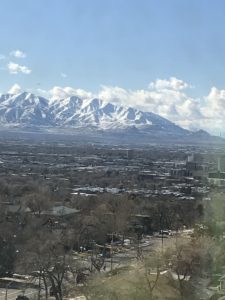
It was a glorious, over-abundant event, spilling over its borders the way the ocean does. Heading home on the overnight flight to JFK Sat night after a day frolicking on the frozen water I had watched darken the plains, I’m tried to fit everything into an orderly pattern. I wonder what will happen if I let go of the program and hash it out as something like a story?
Reality: We started on Valentine’s Day evening above the dinosaur skeletons in the Utah Museum of Natural History with distinguished oceanographer and coral reef scientist Jeremy Jackson‘s opening keynote. He hit us with the hard facts about the Anthropocene ocean and the anthropogenic destruction of the marine ecosystems. The first half of the talk was grim, but then he shifted to a proposed solution in which all the World Ocean outside the Exclusive Economic Zones of each nation would be a Marine Preserve. Allowing oceanic space free from the pressure of industrial fishing would enable fish stocks to recover, so that taking so much away from the fishing industry would not starve the people who rely on protein from the ocean. In some ways it would be a return to the “freedom of the seas” — which made me want to dive into Hugo Grotius and the geopolitics of early modern oceans. The enthusiastic audience was glad to know that I refrained from dragging the Q&A seventeenth-century-ward.
It was a lively, energetic talk, and meeting Jeremy Jackson was a highlight of the trip to Utah. He’s a New Yorker who spent his career in exotic places: underwater on a coral reef in Jamaica, teaching at Scripps in San Diego, and working for the Smithsonian in Panama. Now in emeritus mode, he’s splitting time between coastal Maine and Central Park West. It turns out he and I go to many of the same New York plays. I wonder if he’d enjoy my underwater reading of King Lear before Glenda Jackson in the title role arrives on Broadway this spring?
But Jackson’s doom-rich charts weren’t the only doses of reality laid down from the Revaluing podium. Several experts in Indigenous culture, including Josh Reid, Thomas Swenson, and Holukani Aikau, asked us to think about the long history of colonial violence against land, ocean, and First Nations people. Indigenous conceptions of the relationship between humanity and the nonhuman environment, they argued, have special value as we reconsider the human-ocean relationship in the Anthropocene. I was especially taken by Swenson’s depiction of clashes between colonial and Native fishing practices on the Karluck River on Kodiak Island in the mid-twentieth century — partly because I was remembering my own float and fishing trip down that river in early summer 1995, when my father and I were guests of the Koniag Native Corporation.
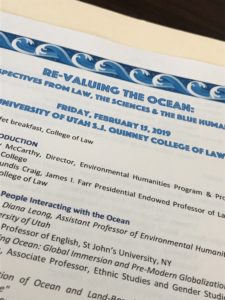
Theory Entwined around the hard trunks of reality snake the intricate tresses of theory. After Jeremy’s flood of facts, I started a turn toward theory first thing Friday morning by hazarding a dualist Ocean that combines Alien and Core, Other and Us. In the same panel, Margaret Cohen’s analysis of underwater film showed how humans use aesthetic techniques to make the alien environment at least partly legible. Both of us were trying to show how thinking with the ocean can shift our understanding of how humans engage the watery part of the world.
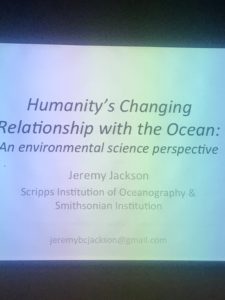
Justice Other presenters challenged us to think about justice for the ocean and for humans. Chris Finlayson, a former Minister from the New Zealand government, and Robin Craig, water-rights lawyer from the University of Utah and one of our co-hosts, showed how legal systems grapple with watery geography and the bi-cultural state of New Zealand. Maxine Burkett, who spoke to us remotely from Hawaii, spoke about her research about emigration from the Marshall Islands to the US, which may perhaps be producing climate refugees already, though many of the individuals in question would refuse that term.
Pedagogy Many presentations emphasized teaching and the ways the ocean can be reshaped into its own best ambassador. Tierney Thys, a film-maker for National Geographic, Brenda Bowman, the head of the University of Utah’s Sustainability Program, and Kate Davis, a scholar of geography recently relocated to Utah from New Zealand, all showed how to teach with Oceans, beaches, garbage, and even computer games. I was struck, as I’m often struck, by how much humans love the ocean, even in its unfathomable and opaque qualities. I want to circulate a version of Kate’s coastal resource planning online game for my coastal CT neighbors!
Solutions? Jeremy Jackson suggested toward the end of the day on Friday that in the sciences you need to point toward solutions, not just open up questions. We laughed in response, because that’s not how the humanities always works. But Jeremy’s vision of the deep ocean as a fishing-free Marine Preserve — an area of maybe 80% or more of the 360 millions square kilometers that Ocean covers — was grand, inspiring, and bracingly nonhuman. “We have to leave most of it alone,” he noted about the ocean on an early slide in his lecture. I wondered about that: I love the Marine Preserve, but I’m less eager to avert my eyes and imagination. In thinking about the economics and ecology of the ocean today, Jackson often demonstrated that the value of, for example, sharks as attractors of tourism dollars produce more income than their price as ingredients in soup. But scuba-driven access to the undersea is a new thing, emerging only in the twentieth century. Seeing the glories of the underwater world is a bit older — Margaret Cohen showed us an image from the late 19c — but that aesthetic access still remains quite recent. I suspect we’re still learning how spending time underwater will change humans.
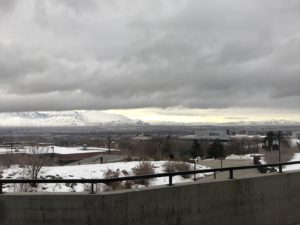
Stories? At the end of the trip, after a sleepless Sat night flight into predawn JFK, I was wondering about different kinds of stories. It’s a literature prof’s sort of thing to always be returning to questions of genre, but the difference between tragic visions of what Jeremy calls “Ocean Apocalypse” and a tragicomic/redemptive plan to renew reefs and seas is essentially, from my point of view, a genre question. A fishless and plactic-overflowing ocean is tragedy; a deep ocean global Marine Preserve snatches tragicomic redemption from contaminated jaws. The pedagogic and activist work of many of our speakers attempts to graft a comic or tragicomic turn onto darkening global and local narratives.
One of my favorite ideas in a rich weekend of imaginative speculation came from Holukani’s notion that a research product could be a lexicon, in her case combining Native Hawaiian words for earth and water with scientific terms and processes. Lexicons are hybrid critters, built to translate, clarify, and connect. I wonder what sort of lexicon this group might have developed given a little more time.
Hearing such a variety of perspectives sends me back into plurality in the waters, including new ways of thinking about which I know little. The project of “Revaluing the Ocean” mixes currents and splashes around in foreign waters. I’ve got a lot to think about, which is what I most love about events of this sort.
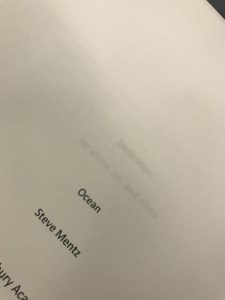
The salty fingers of Ocean touch every coast and rocky promontory, and to some extent the academic’s desire for clarity and unity can’t fit itself all the way around our chosen subject. But story-telling remains among humanity’s most capacious inventions. We’ve been telling sea stories for a long time, from Noah and Odysseus to Jacques Cousteau and Aquaman. The stories of Pacific Islanders and First Nations peoples remain new to me. I’m pleased to have wet my toes on a few unfamiliar beaches in Utah this past weekend.